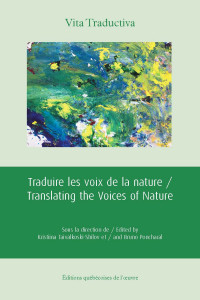Traduire les voix de la nature / Translating the Voices of Nature

Agnes Whifield
Year of Publication: 2019
Publisher website
Ethical questions concerning humans’ relationship to nature have so far gained little attention in Translation Studies, whereas an eco-critical shift seems to be taking place in other human and social sciences. And yet translating, like any human activity, has environmental consequences. In addition to the concrete effects of translating, such as the exploitation and pollution of nature, translated texts influence people’s mentalities and perceptions of nature. Nonetheless, so far there has been little translatological research on the voices of fauna, flora, forces of nature and different ecosystems, even though translation ethics could offer valuable tools for the study of humans’ relationship to nature. The essays in Traduire les voix de la nature / Translating the Voices of Nature seek to contribute to filling this gap. If the “cultural turn” in Translation Studies increased awareness of the ethnocentrism that is inherent in some practices of translation and interpreting, the task of the new eco-criticism – an approach that has fluctuated over time and that varies according to the cultural context – is to move us away from the anthropocentrism that threatens the whole planet.
ERIH PLUS has approved Vita Traductiva for inclusion in its European Reference Index, a key tool for research in the Humanities. Read more in this week's article from Vita Traductiva.
